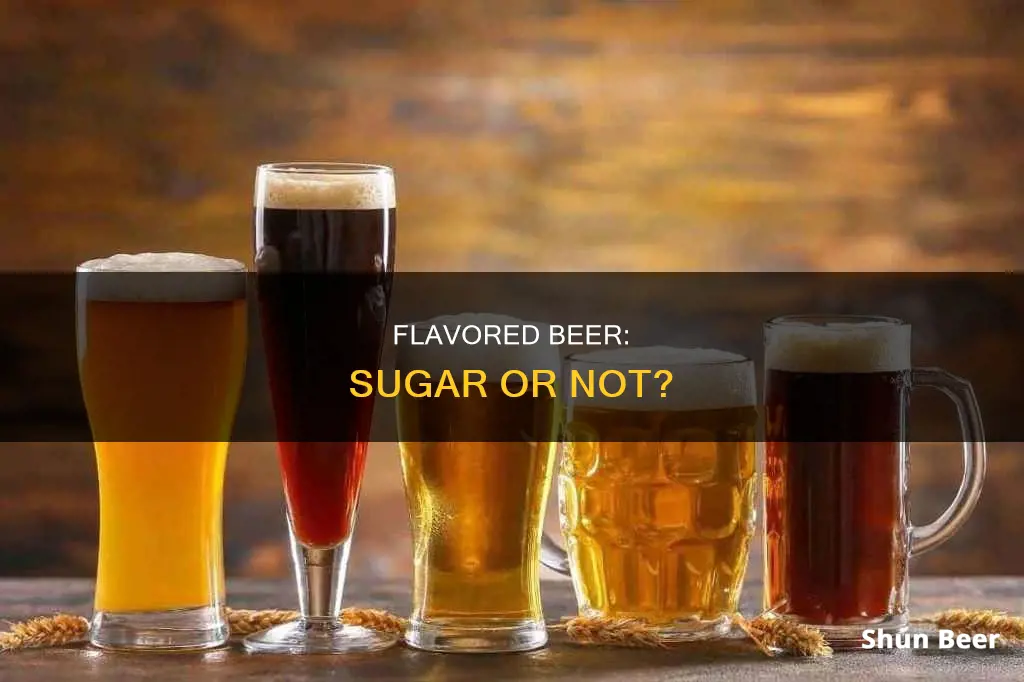
Beer is a popular alcoholic beverage, but does it contain sugar? The answer is yes, but the amount of sugar in beer can vary depending on the type, brand, and brewing method. Most beers contain little to no sugar, as the sugars from the grains are converted into alcohol during the fermentation process. However, some beers may have higher sugar content due to added ingredients like honey or corn syrup, or in the case of non-alcoholic beers, the absence of fermentation.
So, how much sugar is in beer exactly? Well, it depends. Regular beers typically have around 10-13 grams of carbohydrates and minimal sugar, as most of it is fermented. Light beers usually have around 3-6 grams of carbs and little to no sugar. Non-alcoholic beers, on the other hand, tend to have higher sugar content, with around 12-29 grams of carbs and 8-29 grams of sugar.
It's worth noting that the sugar content in beer is generally considered low, and it's the amount of beer consumed that can be a problem. Additionally, beer contains carbohydrates, which can affect blood sugar levels, and it is a significant source of calories. Therefore, it's important to consume beer in moderation, especially if you're monitoring your sugar or calorie intake.
| Characteristics | Values |
|---|---|
| Does beer contain sugar? | Yes, but the amount varies depending on the type of beer and brand. |
| How does sugar get into beer? | Sugar is created during the fermentation process when yeast converts sugars from malted grains into alcohol. |
| Types of sugar in beer | Maltose, glucose, fructose, and oligosaccharides |
| Beer styles with higher sugar content | Stouts, IPAs, dessert beers, wheat beers, sour beers, Belgian ales |
| Beer styles with lower sugar content | Lagers, pilsners, light beers |
| Impact of beer on blood sugar levels | Beer contains carbohydrates that can raise blood sugar levels, while alcohol in beer may lower blood sugar levels. |
| Nutritional facts | Beer is a significant source of calories and carbohydrates. |
What You'll Learn

Does beer contain sugar?
Beer does contain sugar, but the amount varies depending on the type of beer and the brand. The sugar in beer is created during the fermentation process, where yeast converts sugars from malted grains into alcohol. The amount of sugar in beer depends on several factors, including the type of yeast, the gravity of the wort, and any additional flavours added to the beer, such as honey or corn syrup.
The sugar content of beer is typically quite low, with most beers containing little to no sugar after fermentation. However, non-alcoholic beers tend to have slightly higher sugar levels than their alcoholic counterparts because the sugar is not converted into alcohol. Light beers also tend to have slightly more sugar than regular beers due to differences in the fermentation process.
The main type of sugar found in beer is maltose, which is made from two glucose molecules. Other types of sugars that may be present in beer include glucose, fructose, and oligosaccharides.
While beer may not have a high sugar content, it is important to note that it is an alcoholic drink and can still affect your blood sugar levels. Alcohol impairs the body's ability to regulate blood sugar, which can lead to hypoglycaemia or low blood sugar levels. Therefore, it is generally recommended to consume alcohol in moderation and with a carbohydrate-containing meal.
Different styles of beer, such as ales and lagers, will also have varying sugar contents due to differences in yeast activity, brewing temperatures, and ingredients used. For example, lagers typically have a slightly higher sugar content than ales due to their slower fermentation process, resulting in more residual unfermented sugars.
Overall, the sugar content of beer is influenced by various factors, and while it is generally low, it is important to consider the potential impact on blood sugar levels when consuming alcoholic beverages.
Dark Beer's Sweet Secret: Sugar Content Surprise
You may want to see also

How much sugar is in beer?
The amount of sugar in beer varies depending on the type and brand of beer. Generally, beer has less sugar than other alcoholic drinks like wine. However, some beers can have a higher sugar content due to added ingredients, such as honey or corn syrup.
The sugar in beer is created during the fermentation process, which converts the sugars from malted grains into alcohol. The most common sugar in beer is maltose, which is made from two glucose molecules. The amount of sugar in beer also depends on the type of yeast and the brewing method used.
Beer gravity and sugar content
Beer gravity refers to the density of the wort (the liquid extracted from the mashing process during brewing) and is determined mainly by its sugar content. A wort with a high sugar concentration is called a high gravity wort. As yeast ferments the wort, its sugar content decreases, and its alcohol content increases, resulting in a beer with a higher alcohol content.
Sugar content in different types of beer
Regular beers typically contain a moderate amount of fermentable sugars, which are converted into alcohol during the brewing process. Light beers are crafted to be lower in calories and carbs and thus have less sugar. Non-alcoholic beers, on the other hand, often have higher sugar content as the sugars are not converted into alcohol.
- Regular beer: 10.6-12.8 grams of carbs, minimal sugar (most are fermented).
- Light beer: 3.2-5.9 grams of carbs, 0-0.3 grams of sugar.
- Non-alcoholic beer: About 12.2-28.5 grams of carbs, 8-28.5 grams of sugar.
Impact of beer consumption on blood sugar
Beer contains carbohydrates that can spike blood sugar levels, while the alcohol in beer may lead to low blood sugar (hypoglycemia). Therefore, it is generally recommended to consume beer with a carb-containing meal to maintain blood sugar balance.
Beer vs Crown Whiskey: Which Has Less Sugar?
You may want to see also

How does sugar get into beer?
Beer typically contains very little sugar, and this is mostly derived from the fermentation process. During fermentation, yeast converts fermentable sugars into alcohol and carbon dioxide, leaving behind varying levels of residual sugars. The amount of sugar in beer is also influenced by the type of yeast, the beer's gravity, and any additional flavours included, such as honey or corn syrup.
The Beer-Making Process
The beer-making process starts with four basic ingredients: water, grains (often barley or wheat), hops, and yeast. Here's a step-by-step breakdown:
- Malting: Grains are soaked, germinated, and dried to convert stored starches into fermentable sugars, mainly maltose.
- Mashing: The malted grains are soaked in hot water to release these sugars, creating a sweet liquid called wort.
- Boiling: Hops are added for flavour and to balance the sweetness with bitterness. The wort is also sterilised during this step.
- Fermentation: Yeast is introduced to the cooled wort, and it ferments the sugars, producing alcohol and carbon dioxide, thus transforming the wort into beer.
- Maturation: The beer is stored and left to age, developing flavours and carbonation until it's ready to be served.
The Role of Sugar in Brewing
The sugars in beer come from the grains, not from direct addition, unless specified in particular styles like some craft beers that might use honey or corn syrup for a distinctive flavour. During fermentation, yeast converts these sugars into alcohol and carbon dioxide. While most sugars are converted, the residual sugar that remains contributes to the beer's taste and body.
Types of Sugar in Beer
The most common type of sugar in beer is maltose, which is a disaccharide composed of two glucose molecules. It provides the subtly sweet undertone in your brew. Other sugars like glucose and fructose can also be present, especially in beers that add fruit during the brewing process, such as tropical IPAs or ciders.
Beer Sugar Content: Is It Really That High?
You may want to see also

What are the different types of sugar in beer?
Beer contains several types of sugar, with maltose being the most common. It is a disaccharide, made up of two glucose molecules, and provides a subtly sweet undertone to the brew. Other sugars found in beer include glucose, fructose, sucrose, maltotriose, and dextrins (oligosaccharides).
The amount and type of sugar in beer depend on the specific beer style and brewing method. For instance, lagers and pilsners tend to have less sugar, while heavier, maltier beers like stouts usually have higher sugar levels.
The sugar in beer comes from the grains used in the brewing process, such as barley or wheat. During the malting process, these grains are soaked, germinated, and dried, which breaks down their starches into fermentable sugars. The resulting sweet, malty liquid is called wort, which the yeast then ferments into alcohol and carbon dioxide.
While most of the sugar in wort is converted into alcohol, some residual complex sugars remain, contributing to the sweetness of the final beer. Additionally, brewers may add other sugar-containing ingredients like honey or corn syrup to enhance the flavour of their beer.
Champagne vs Beer: Which Has a Higher Sugar Content?
You may want to see also

How does beer's sugar content affect blood sugar levels?
Beer does contain sugar, but the amount varies depending on the type of beer. The sugar in beer comes from the grains used in the brewing process and is then fermented by yeast to produce alcohol. This means that most of the sugar is converted into alcohol, resulting in a low sugar content in the final product. However, some sugar remains, influencing the beer's flavour and body.
Now, let's explore how the sugar content in beer affects blood sugar levels:
Beer can increase blood glucose levels:
Beer contains carbohydrates that are absorbed into the bloodstream relatively quickly, leading to elevated blood sugar levels soon after consumption. This effect is more pronounced with heavier craft beers or beers with higher carbohydrate content.
Drinking a lot of beer can decrease blood glucose levels:
While hypoglycemia or low blood glucose levels can be caused by various factors, alcohol consumption increases the risk for people with type 1 diabetes and type 2 diabetes using insulin. The American Diabetes Association warns that the effects of low blood sugar can range from mild symptoms like fatigue and sweating to more severe consequences such as confusion, abnormal behaviour, blurred vision, seizures, and loss of consciousness.
Beer impacts blood glucose levels:
Alcohol stimulates appetite, so drinking beer with a meal may lead to overeating, increasing blood glucose levels and potentially contributing to weight gain.
Alcohol interferes with blood sugar regulation:
According to the NIH, alcohol disrupts the hormones that regulate blood sugar levels. Dr Kelvin Fernandez, an internal medicine physician, explains that "alcohol diverts metabolic pathways, disrupting glucose production in the liver, and contributing to low blood sugar." Alcohol can also decrease insulin sensitivity, making it harder for the body to regulate blood sugar effectively.
Alcohol can affect diabetes medications:
Alcohol may interfere with hypoglycemic medications, reducing their effectiveness in managing blood sugar levels.
The immediate effect of drinking beer is an increase in blood sugar levels due to the presence of carbohydrates. However, over a more extended period, these levels will decrease as the body processes the alcohol. This can be challenging for individuals with diabetes or prediabetes, who need to closely monitor their blood sugar levels.
Additionally, it is important to note that the amount of beer consumed plays a significant role. Drinking in moderation is generally recommended, with no more than one to two drinks per day for women and men, respectively.
Budweiser Beer: Sugar Content and Nutritional Facts
You may want to see also
Frequently asked questions
Yes, beer does contain sugar. However, the amount of sugar in beer varies depending on the type and brand. The sugar in beer is created during fermentation, where yeast converts sugars from malted grains into alcohol.
Beer gravity is a measurement of the sugar content in a beer, typically taken before and after fermentation. High-gravity beers tend to have more sugar, while low-gravity beers have less.
It depends on the type of beer and the quantity consumed. Some beers may have higher sugar content, while others are relatively low in sugar. If maintaining stable blood sugar levels is a priority, it's best to limit beer and other alcoholic drink consumption.
Yes, certain beer types are known for their higher sugar content. These include sweet stouts, fruit beers, and certain Belgian ales. Always check the label or look up the specific nutritional information for the beer in question.







